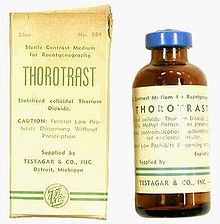Thorotrast
Thorotrast is a suspension containing particles of the radioactive compound thorium dioxide, ThO2; it was used as a radiocontrast agent in clinical radiography in the 1930s to 1950s.
Because the suspension offered high image quality and had virtually no immediate side-effects compared to the alternatives available at the time, Thorotrast became widely used after its introduction in 1931.
However, today it has shown to increase risk of certain cancers, such as cholangiocarcinomas, angiosarcomas and hepatocellular carcinoma, and fibrosis of the liver.
German patients exposed to Thorotrast had their median life-expectancy shortened by 14 years in comparison to a similar non-exposed control group.
Today, hydrophilic (water-soluble) iodinated contrast agents, which are not radioactive, are universally used intravenously in clinical X-ray procedures.
[citation needed] In the decades after the cessation of its clinical use, Thorotrast has sometimes been used in laboratory research to stain neural tissue samples for examination by historadiography.
